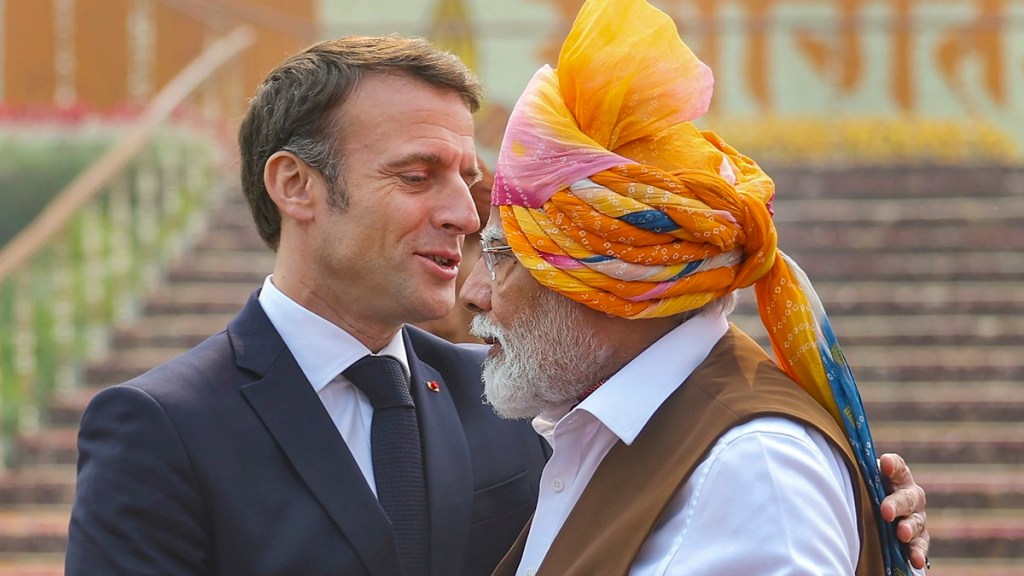Shiv Bhagwan Saharan
On January 26, 2024, Emmanuel Macron became the sixth French president to be honoured as India’s chief guest at the Republic Day celebrations and parade, a testament to the deepening strategic partnership between the two nations on their 25th anniversary. Accompanying Macron, a 95-member contingent and a 33-member band from France took part in the march past. Additionally, the fly-past featured two Rafale fighters and an Airbus A330 multi-role tanker transport aircraft from the French Air and Space Force (FASF).
Before him, Jacques Chirac, Valery Giscard d’Estaing, Nicolas Sarkozy, and François Hollande were also invited by India as chief guests on Republic Day. Furthermore, France has extended a similar honour to prominent Indian leaders, including former Prime Minister Manmohan Singh, in 2009 and, last year, on July 14, Prime Minister Narendra Modi for Bastille Day celebrations and parade. Notably, PM Modi’s visit coincided with the 25th anniversary of the strategic partnership between India and France. Also, President Macron visited India for the G-20 Summit on September 9-10, 2023, and earlier in March 2018.
Bilateral Relations and 25th Year of Strategic Partnership
Historically, Indo-French relations trace their roots to 1674, with the arrival of the French in India, particularly in Pondicherry—subsequently, the French established colonies at Pondicherry, Karaikal, Yanam, Mahe, and Chandanagar. In 1954, all these territories were peacefully transferred to India. From the beginning, India and France have maintained diplomatic ties.
Moreover, India and France established diplomatic relations in 1947. Further, France also provided support to India during the Cold War and, notably, tacitly endorsed India’s nuclear capabilities. France was among the states that did not join the United States-led initiative to impose sanctions on India following its nuclear tests conducted in Pokhran in May 1998.
Later, in 2008, France became the first country to sign a civil nuclear deal with India. The two countries elevated their relationship to a strategic partnership in 1998, and as of 2023, it marks 25 years since the signing of this partnership. Despite the longstanding ties, it is noteworthy that the pace of diplomatic cooperation between India and France has significantly accelerated in the last decade.
According to media reports, India and France’s diplomatic ties stand on three key principles: a commitment to strategic autonomy, mutual respect for non-interference in internal affairs, and non-alignment. Also, Former Indian Ambassador to France, Mohan Kumar, highlighted that “France was the first country to recognise the strategic importance of India after the nuclear tests in 1998. The partnership with France is India’s most important strategic partnership in Europe. It is one of India’s rare partnerships that is marked by total convergence.”
The relationship between the two nations is deepening, drawing strength from their mutual belief in a multipolar world, shared democratic values, and the rule of law. The French foreign ministry also stated that the partnership “focuses on civil nuclear energy, counter-terrorism, space cooperation, green hydrogen, cyber security, digital technologies, Artificial Intelligence, and defence.”
Defence constitutes a major pillar in the strategic partnership between India and France, with India emphasising Atmanirbharata (self-reliance) in defence, focusing on goals centred around co-production and co-development, particularly in the construction of submarines and naval vessels. During Modi’s visit to Paris, enhanced cooperation between the two countries’ defence space agencies was envisioned. The ongoing project to construct six French-origin nuclear reactors at Jaitapur remains under consideration, and discussions also encompass cooperation in Small and Advanced Modular Reactors. Additionally, space-based Maritime Domain Awareness emerges as a crucial potential area for collaboration.
Following PM Modi’s visit to France on Bastille Day in July of last year, the two nations established a comprehensive roadmap for the Indo-French Strategic Partnership – Horizon 2047. The significance of the year 2047 lies in multiple aspects, marking 100 years of India’s Independence, a century of diplomatic relations between India and France, and 50 years of the Indo-French strategic partnership. Both countries have committed to enhancing defence cooperation, a pivotal component in their bilateral ties. Notably, France stands as India’s second-largest arms supplier after Russia. According to a SIPRI report published last March, France’s defence exports to India experienced a remarkable 489 per cent increase between 2013-17 and 2018-22.
In the context of the Indo-Pacific, India, boasting the strongest navy in the Indian Ocean, emerges as a valuable partner for France in the Indo-Pacific region. Where France has many overseas territories in both the Indian and Pacific Oceans and holds a significant military presence in the area, recognising their shared interests, both nations have decided to establish an Indo-Pacific trilateral fund to support countries in the region with startups and various innovation projects. While France, unlike India, does not face a direct security threat from China, it shares growing concerns, along with Europe, about China’s assertive international stance. France is particularly mindful of the potential erosion of its position in the Pacific and the western Indian Ocean due to China’s increasing influence. However, the diplomatic collaboration between India and France in the maritime domain is tangible and poised for further growth.
During Modi’s visit last July, a new Indo-Pacific Roadmap was adopted, emphasising the significance of trilateral cooperation with like-minded regional partners. The United Arab Emirates and Australia are highlighted as key collaborators in the Indo-Pacific. India, France, and the UAE recently conducted a substantial joint air exercise, underscoring the commitment to enhancing regional cooperation.
The Indo-French relationship continues to evolve and deepen across various dimensions, from historical ties to strategic partnerships and from defence collaboration to addressing contemporary challenges and opportunities in the Indo-Pacific. Additionally, the shared values of democracy, multipolarity, and the rule of law underpin their enduring partnership, ensuring that the years ahead will witness further growth and cooperation between these two nations.
The author is a Doctoral Candidate at the School of International Studies (SIS), Jawaharlal Nehru University, New Delhi. He tweets at @ShivBhagwan_JNU.
Disclaimer: Views expressed are personal and do not reflect the official position or policy of Financial Express Online. Reproducing this content without permission is prohibited.

